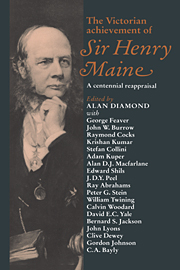Book contents
- Frontmatter
- Contents
- Notes on contributors
- Foreword by Sir John Lyons
- Introduction
- 1 The Victorian values of Sir Henry Maine
- PART 1 MAINE AND THE IDEA OF PROGRESS
- PART 2 MAINE AND THE SOCIAL SCIENCES
- PART 3 MAINE ON LAW, LEGAL CHANGE AND LEGAL EDUCATION
- 11 Maine and legal education
- 12 Maine and legal education: a comment
- 13 A wake (or awakening?) for historical jurisprudence
- 14 Further thoughts on Maine's historical jurisprudence
- 15 Fictions, equity and legislation: Maine's three agencies of legal change
- 16 Law and language: a metaphor in Maine, a model for his successors?
- 17 Linguistics and law: the legacy of Sir Henry Maine
- PART 4 MAINE AND INDIA
- Appendix: the conference programme
- Bibliography
- Index
12 - Maine and legal education: a comment
Published online by Cambridge University Press: 04 September 2009
- Frontmatter
- Contents
- Notes on contributors
- Foreword by Sir John Lyons
- Introduction
- 1 The Victorian values of Sir Henry Maine
- PART 1 MAINE AND THE IDEA OF PROGRESS
- PART 2 MAINE AND THE SOCIAL SCIENCES
- PART 3 MAINE ON LAW, LEGAL CHANGE AND LEGAL EDUCATION
- 11 Maine and legal education
- 12 Maine and legal education: a comment
- 13 A wake (or awakening?) for historical jurisprudence
- 14 Further thoughts on Maine's historical jurisprudence
- 15 Fictions, equity and legislation: Maine's three agencies of legal change
- 16 Law and language: a metaphor in Maine, a model for his successors?
- 17 Linguistics and law: the legacy of Sir Henry Maine
- PART 4 MAINE AND INDIA
- Appendix: the conference programme
- Bibliography
- Index
Summary
As a freshman at Oxford in the 1950s I was told that I was expected to ‘read round the subject’. We were presented with a ‘general reading list’ that read like a list of Great Books about law. Knowing no better, during the next two years I read a reasonable number of items on the list: Maitland's The Forms of Action, Holmes’ The Common Law, Friedmann's Law and Social Change in Contemporary Britain, Hewart's The New Despotism and several works by C. K. Allen. Ancient Law was on the list and I read it one vacation. I remember thinking that it was not quite as racy or as readable as its reputation suggested, but on rereading it this summer I was surprised that as an undergraduate I had actually managed to finish it. Perhaps this was only possible because I had already studied some Roman law and I could see its relevance to my three papers in Roman law and to analytical jurisprudence. Significantly it was recommended and perceived as general background to our degree course, which was highly integrated and very particularistic: in Oxford at the time English legal system was mainly the history of English courts (contrast, for example, René David's Les Grands Systèmes de droit contemporain); legal history was largely the history of the sources of law and of contract, tort and land law – all in English law; I had but four tutorials, on Saturdays, on constitutional law; and Roman law consisted mainly of parsing Latin texts and the study of contract, sales and delict, sometimes in detailed comparison with their modern English counterparts.
- Type
- Chapter
- Information
- The Victorian Achievement of Sir Henry MaineA Centennial Reappraisal, pp. 209 - 216Publisher: Cambridge University PressPrint publication year: 1991

